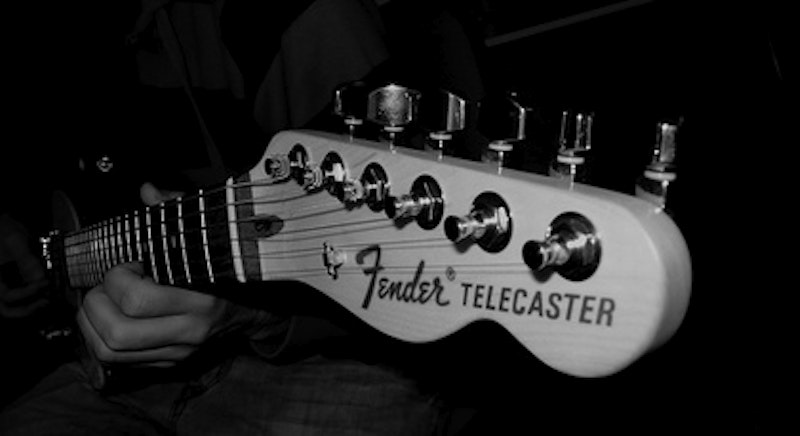When I was a freshman in college, I performed at an open mic with my guitar and my deplorable singing ability. Nothing too out of the ordinary in that, I suppose. Up to that point, my tastes in music were vaguely founded on the Caucasian classic rock my father fed me in the cradle—Dire Straits, Derek and the Dominoes, Tom Petty and the Heartbreakers, Pink Floyd, Bob Dylan—and the contemporary stuff I discreetly hijacked from my brother: Dave Matthew Band, Hootie and the Blowfish, MC Hammer, Alanis Morissette, Disney soundtracks (actually, those were mine) and, believe it or not, the Fugees (one out of six…).
Nothing to really brag about, I concede.
Earlier that freshman year, the indelible cliché was once more re-proved: a more-hip-than-me girlfriend brought me into her dorm room where we sat, in the dark, stoned, listening to Radiohead. I was transfixed.
Back to the open mic.
I did my thing, and once I was sitting down a longhaired, plaid-shirted fellow approached me. He thought I was someone else (there were several Andrew Kleins in the greater Ann Arbor area at the time), but we got to talking and soon he was up on stage with my guitar doing some jazz/bluegrass stuff. Then a kid with a massive Jewfro, yellow Michigan sweatshirt, headband, pajama pants and a harmonica fastened around his neck performed a blues number. After everyone was done, he approached Longhair-Plaid-Shirt and me and asked if we wanted to do a blues jam to end the night. We agreed, found a drummer, and our blues band was born.
What did I know of the blues? The classic rock I knew (and which was my measuring stick for “real” music) was certainly blues-y, but names like Lightning Hopkins and Robert Johnson were familiar in name-recognition value only. But the other two guys had a good idea of the blues, and away we went with me in tow. We started gigging, once, twice, three times a weekend—frats, bars, charities (lots of charities) and fundraisers—and people loved it. Somehow four very white college kids were able to play some janky, sloppy and loud blues and not only get away with it but also have a hell of a good time in the process.
More so than the Radiohead experience, performing blues music in front of appreciative crowds was transforming. Of course, being in a band of any stripe is awesome (and difficult). But for me, it went beyond the ego trip of loud guitars and the occasional flirting. As we played more and more, I dug more and more into the blues, tuning into the greats and picking out the lesser-knowns that hit me hardest. I was getting into black music and there was no turning back. Classic rock lost its “classic” designation and I understood it to be white interpretation. I wasn’t denouncing it, but I had irrevocably moved on.
I recently found an approximate inverse of my transformation (and the inspiration for this post) in a few pieces of writing by political-cultural-media-music-sports Atlantic blogger Ta-Nehisi Coates.
From Time (before he was at the Atlantic):
Then one day I turned 25, turned on BET and realized that the music that marked my identity suddenly had nothing to say to me. I polled my friends and came to the conclusion that I was part of a lost generation--rabid African-American rap fans who had sadly concluded that the soundtrack of their lives was scratched. Most of them self-medicated with Alicia Keys or soft jazz. Others simply turned off the radio completely, preferring to replay the hits of their youth, hoping to recapture the moment they first mastered the snake or the cabbage patch.
Coates revisited the above 2005 article the other day:
When I decided to integrate my collection, one major factor stood in the way--white rockers and their unvarnished love of the electric guitar. Part of that was real, and part of it was imagined. I'm sure some of my black readers who haven't made the leap can relate to the following: You know how some white people hear "black guy" and immediately picture some dude running from the cops? Anytime, anyone mentioned "white people" and "music" all I could hear were blaring guitars. Sure enough, when I ventured out, the loud guitars of The Strokes, The White Steipes [sic] and The Yeah Yeah Yeahs were waiting for me.
For Coates, getting into white music opened up his understanding of the broader musical spectrum. Though while he, for a time, purposefully ignored white music, I simply had no earthly idea what black music even was.
And there was disdain, once the band was in full swing. What the hell are a bunch of white boys doing playing blues? Upper-middle class bullshit, covering “Red House” and “Baby Please Don’t Go” to sweaty, grinding mobs of white people? Ultimately, I couldn’t give a shit. Music is music is music, and no matter you process or experience or digest it you won’t get anywhere if you throw in identity politics.
My band eventually petered out, but, right on cue, I met one Lloyd Cargo, who repotted me with a heap of soul and r&b fertilizer (and the Beatles and Wilco for good measure). And I can safely say my life is on a better track than when I was into Hootie and DMB (let he who is without sin cast the first stone…).
Now I listen to Radiohead, the Black Keys and Wilco with as much comfort and familiarity as Otis Redding, Big Bill Broonzy and the Fugees (The Score is on my all-time list). Once I knew nothing (less than nothing), now I know something. The music remains.

